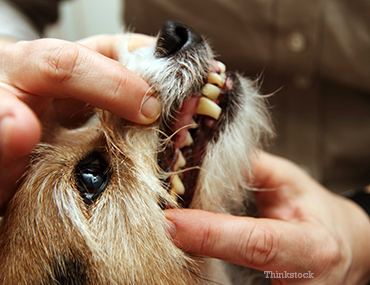
Why do teeth break and fracture?
It should come as no surprise that, just like us, dogs and cats can fracture or break their teeth. In fact, when you think about all the crazy things some animals chew, it is surprising they don’t fracture their teeth more often. You may already know that pets can break their teeth when chewing on hard objects such as crates, bones, rocks or metal, but not everyone realizes many dogs fracture their teeth when chewing on hard treats like cattle hooves. In addition, any facial trauma, for example, a fall or being hit by a car can fracture teeth.
Signs your pet may have a fractured tooth
- Pain
- Reacting or flinching when the mouth or tooth is touched
- Drooling
- Trouble eating
- Abnormal chewing (like chewing only on one side of the mouth)
- Anorexia
- Refusing to eat hard food or hard treats
- Bloody saliva
- Facial swelling
- Unusually irritable temperament
It is important to realize that while these are some of the most common signs and symptoms seen in animals with fractured teeth, often there are no signs at all. Even though an animal may have a painful tooth fracture, they may hide the pain and continue to eat normally.
 Diagnosing a tooth fracture
Diagnosing a tooth fracture
If your pet breaks a tooth, the best thing to do is take him to your veterinarian as soon as possible. Your veterinarian will do a complete examination to determine the severity and extent of damage sustained by the affected tooth. Your vet will determine if the fracture involves the pulp cavity (the center of the tooth containing living cells and the nerve) or the tooth roots. She will likely recommend oral x-rays (radiographs) to check the tooth below the gum line and see if the pulp cavity is affected.
Treatment of a tooth fracture
Treatment depends on the extent of the damage and which part of the tooth is involved. Not all broken teeth require treatment. Ultimately, whether treatment is needed or not depends on which part of the tooth is damaged. When the pulp cavity is not affected your veterinarian may need to merely file the rough or sharp edges of the chipped tooth down or, if it is not sharp, they may recommend just monitoring the tooth.
More complicated tooth fractures involving the pulp cavity require endodontic treatment; this involves a root canal or extraction. Root canals save the tooth and are less invasive and traumatic than extractions. Doing nothing is not a viable option as this type of tooth fracture can be quite painful and lead to complications. After all, if you broke your tooth you would immediately see your dentist for treatment; a fractured tooth is very painful. Well, the same holds true for your pet. Ultimately, the goal of treatment is to maintain a vital tooth and—at a minimum—alleviate pain and prevent infection and other complications.
Complications of a tooth fracture
Left untreated, complicated tooth fractures can lead to a number of different problems. Tooth fractures involving the pulp cavity can allow bacteria present in the mouth to get into the pulp canal and lead to an infection or abscess. This in turn can lead to infections around the tooth root (periapical tooth infections), bone loss, the development of an abnormal connection between the oral cavity and nasal cavity (oronasal fistula), chronic sinus infections, or mandibular fractures if the lower teeth are involved.
If you think your pet has a broken, chipped or damaged tooth, be sure to have your veterinarian take a look at your pet’s mouth as soon as possible. Also, don’t forget to bring your pet in for regular check-ups. I have personally discovered many animals with dental problems during a routine examination. Lastly, I encourage pet owners to get into the habit of brushing their pet’s teeth and checking their pet’s mouth regularly in order to identify problems early. And of course, watch what your pet is chewing on and stay away from hard objects that may damage teeth. For more information about dental disease or caring for your pet’s teeth speak with your veterinarian.
If you have any questions or concerns, you should always visit or call your veterinarian -- they are your best resource to ensure the health and well-being of your pets.
